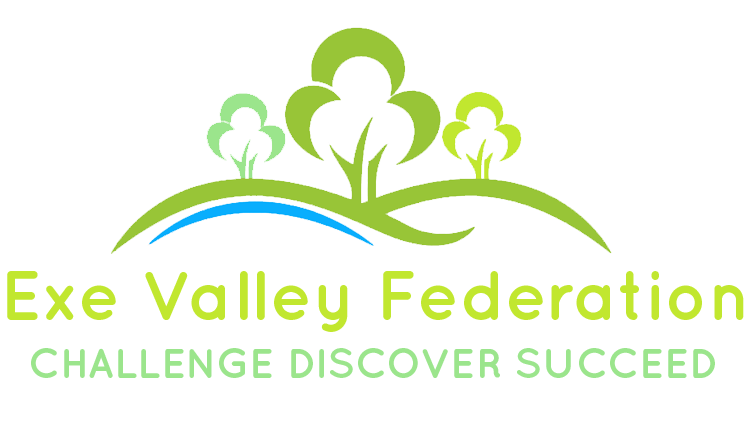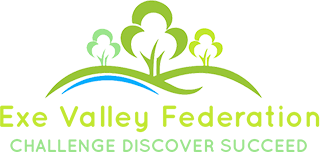Curriculum

“In a creative, caring environment, we all support and challenge each other to develop confidence and independence. As active global citizens, we are inspired to discover and succeed in lifelong learning.”
CURRICULUM VISION
The Exe Valley Federation’s vision for education enables children to flourish in a creative and caring environment. This vision is realised by encouraging everyone to support and challenge each other to develop independence, resilience and confidence so that we can enjoy a lifetime of learning.
Our vision is that children who are safe, happy and cared for learn best and that their emotional well-being is every bit as important as their learning. Reflection, curiosity, joy, awe, wonder, resilience, creativity and spirituality are all part of our curriculum, even though they are not measurable in the same way as the formal curriculum.
Our curriculum gives everyone this opportunity and encourages learning in the broadest sense through lessons, projects, home learning, visits and visitors and using the world around us to develop skills that will last a lifetime. The curriculum comprises all the learning and experiences that each school plans for its children. The National Curriculum forms one part of the school curriculum.
The curriculum is designed to be ambitious and expects that every child will be the best that they can be, regardless of their starting points in life. We support children who do not have opportunities to experience the wider world through our teaching, visits and other activities that build a rich and diverse foundation for a secure future.
The curriculum shapes and determines what children will gain from their educational experience. It is the substance of what is taught and is built on the progression of skills and knowledge that children will need to gain to become responsible global citizens of the future.
The EVF has chosen a knowledge-engaged curriculum. This means following a skills-progression curriculum model with knowledge underpinning the application of skills. The 2002 Education Act requires schools to provide a ‘balanced and broadly based curriculum’ which promotes the spiritual, moral, cultural, mental and physical development of children at our schools and prepares them for the opportunities, responsibilities and experiences of later life. We intend to deliver the 2014 National Curriculum in a purposeful, engaging and creative way by providing a broad curriculum that ensures that there are enough subjects on the timetable and a balanced curriculum that ensures that each subject is given sufficient space on the timetable to deliver its distinct contribution.
CHERITON FITZPAINE PRIMARY SCHOOL
Our curriculum has been carefully designed to ensure broad and balanced coverage of the National Curriculum, while being enhanced through trips, experiences and visitors. We feel strongly that our curriculum should reflect children’s own experiences and interests. Many of our families are from farming backgrounds, and our village has a rich rural heritage and this is reflected in our curriculum through educational visits to our local farms, learning about farming history, sustainable practices and managing the environment. This is embedded in our topic choices, which celebrate our local, rural community and compare them to more urban or coastal locations. A sense of belonging and community is key, so we incorporate this into all areas of school life, while opening up the children’s knowledge of the world in which they live. We hope that this varied curriculum will serve them well as they take the next step in their education, and become active global citizens, who are inspired to discover and succeed in lifelong learning.
Due to our mixed age classes, we follow a 2 year rolling programme. Please note that our EYFS Rolling Programme provides an overview of topics and themes across the year. Detailed planning is devised on a shorter term basis according to the needs and interests of each cohort. Careful consideration has been given to how our EYFS curriculum prepares pupils for future learning in Y1 and beyond. Our half termly units of work alternate between a history or geography driver, with explicit links being made to prior learning (as seen in our Key Learning documents). This helps learners to make sense of new knowledge, to create links between past experiences, and to apply previously learnt skills to new areas.
‘Golden threads’ of learning are weaved throughout our curriculum, which ensure that key concepts, knowledge and skills are revisited and built upon as the children progress through the school.
While some subjects (such as Science and Computing) are taught discretely, we make links between subjects on half termly topics to reinforce curricular content and ensure children learn and remember more.
Sequences of work are carefully planned to ensure children gain the key knowledge and skills intended throughout a unit. These are clearly shown on our cover pages, which can be seen under each class page. These component parts lead towards a final composite task, in which children demonstrate the depth of their learning, and enable pupils to answer the overarching big question.
We think it is vital that learners are engaged and motivated by their topics. We plan an exciting trip, visitor or experience for each topic. These are known as our ‘Memorable Moments’.

